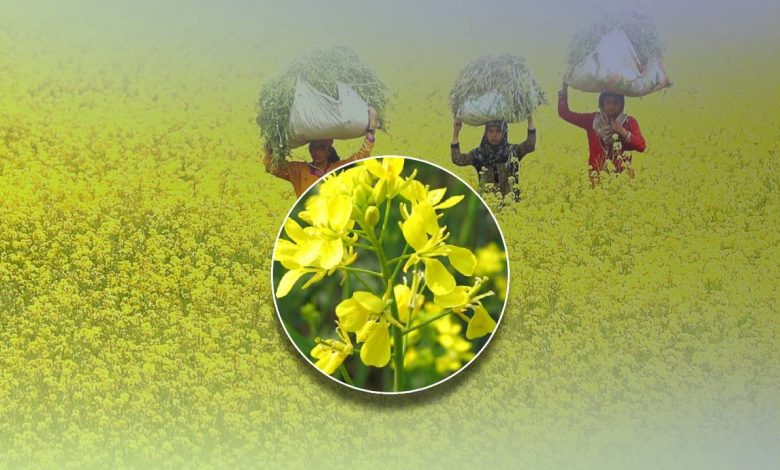Daily Current Affairs for UPSC
GM Mustard

Topic- Agriculture, Science and Technology [GS Paper-3]
Context- The Genetic Engineering Appraisal Committee (GEAC) has provided environmental clearance for genetically-modified mustard.
What is GM Mustard?
- By genetically-modified we mean crossing two genetically dissimilar plant varieties that can even be from the same species.
- The first-generation (F1) offspring from such crosses tend to have higher yields than what either plant variety can individually give.
- Scientists at Centre for Genetic Manipulation of Crop Plants (CGMCP) have developed the GM mustard Dhara also known as DMH-11 contains two alien genes isolated from a soil bacterium called Bacillus amyloliquefaciens.
- The CGMCP has deployed the barnase-barstar GM technology to create a robust and viable hybridisation system in mustard.
- This process was used to develop DMH-11 by crossing a popular Indian mustard variety ‘Varuna’ or the barnase line with an East European ‘Early Heera-2’ mutant.
- DMH-11 is claimed to have shown an average 28% higher yield as compared to Varuna.
- The most important aspect of the technology was that it had used the barnase and bar genes system for creating diverse parents and the chances of yield enhancement was more.
Approval of the GM Mustard
- Recently the Genetic Engineering Appraisal Committee (GEAC) has given environmental clearance for genetically-modified mustard.
- However there was no need to go for clearance by the Environment Ministry as the hybrid was environmentally released by the GEAC.
- The ICAR has an established system to coordinate research projects, known as the All India Coordinated Research Project, in which scientists test the hybrid and varieties developed by different institutions.
- The GEAC has given environmental clearance for Dhara Mustard Hybrid (DMH -11).
- Hence, this hybrid can now be tested in the all India coordinated trial of AICRP for its yield advantage.
- If it is found for higher yielding, then it will be released for commercial cultivation.
- The applicant, the Centre for Genetic Manipulation of Crop Plants (CGMCP), can also approach the Protection of Plant Varieties and Farmers’ Rights Authority (PPVFRA).
- The developers of the technology can also register the hybrid with PPVFRA and can obtain plant breeders’ rights and with that right they can go for commercialising the hybrid through companies or other institutions.
Significances
- By getting environmental clearance, genetically-modified mustard would lead to finding a science-based solution for a major challenge, the edible oil import.
- The clearance would also allow the development of more high yielding hybrids in the sector.
- The environmental release of GM mustard would provide an opportunity for mustard breeders to develop diverse and high-yielding hybrids of mustards.
- The Environment Ministry had earlier sought studies on the impact of the genes on soil microbes.
- Regarding the effect of GE mustard on honey bees and other pollinators internationally-available data was looked into this and in Canada, between 2012 and 2020 a similar system was used and there was a significant increase in the number of bee colonies.
- Barnase and bar genes are protein and honey is basically sugar without any protein content. So the question of honey being affected by this does not arise. As these genes are safe.
Genetic Engineering Appraisal Committee (GEAC)
- The Genetic Engineering Approval Committee (GEAC) is an apex regulatory body established under the Environment Protection Act 1986 of the Ministry of Environment Forests (MoEF).
- Further the body was renamed as the Genetic Engineering Appraisal Committee in order to impose a moratorium on Bt brinjal and the decision was taken to commercialise Bt brinjal.
- The committee is chaired by the Special Secretary or Additional Secretary of MoEF&CC and co-chaired by a representative from the Department of Biotechnology (DBT).
Functions of GEAC
- The Genetic Engineering Appraisal Committee (GEAC) works under the Ministry of Environment, Forest and Climate Change (MoEF&CC).
- GEAC is responsible for granting permits to conduct experimental and large-scale open field trials and also approve the commercial release of biotech crops.
- The committee is also responsible for the appraisal of proposals relating to the release of genetically engineered (GE) organisms and products into the environment including experimental field trials.





.png)



